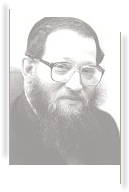
In this week's parsha Toldos, we read about the blessings which Yitzchok blessed his son Yaakov. These blessings apply, of course, not only to Yaakov but also to the Jewish people for eternity. One of the blessings is "Cursed is everyone who curses you, and blessed is everyone that blesses you." (Bereishis 27:29) As more details on the story of an Arab ex-convict on his way to converting to Judaism are revealed, the more astonishing it becomes. The following true story which is currently on-going, will inspire us all to see the great lengths non-Jews are going through to join the blessed nation.
Yaniv Ben-David, an Arab from the territories and Haifa whose official name until recently was Busmon Abu-Ras, found Judaism and Hashem while serving a 12-year term in prison. The full miraculous story has come out in three interviews, including one with Arutz-7’s Hizky Ezra and another on Radio Kol Chai with the head of the Civil Administration, Brig.-Gen. Yoav Mordechai, known as "Poli."
Yaniv’s speech is liberally sprinkled with “May Hashem’s Name be blessed” and the like, as if he had grown up all his life in a traditional Sephardic neighborhood. But in actuality, his story is very different. Without getting into details, he explains that he became involved in criminal activity of which today he is very ashamed, but that once in jail, no one in his family ever visited him. “My crime was not related to terrorism, Heaven forbid, chas veshalom,” he says, “but I don’t want to discuss it.”
“Some of the Jews in prison with me,” he relates, “began talking to me, and said things like, ‘There’s something special about you, something that doesn’t seem to belong to that world that you came from... You seem to have a spark of Jewishness... Specifically, one very special guy began teaching me about Judaism, and little by little, I began to enter the world of holiness and Torah and the Chosen Nation, etc., may Hashem’s Name be blessed...”
At the same time, however, that he was undergoing changes in his religious outlook and identity, the prison authorities were preparing him for another change: Early release from jail, back into the areas of the so-called "Palestinian Authority" – where he knew there were many who would seek to kill him for his connections with Jews and Israelis.
Here’s where Providence stepped in. Gen. Mordechai relates: “I was driving shortly before midnight on Route 443 to Modiin where I live, when I saw a strange sight at the checkpoint, and I stopped; apparently, everything is truly from Heaven. I saw this young man, Yaniv, crying and sobbing at the checkpoint, and he told me an amazing story – of how he had come close to Judaism while in prison, and how all his requests and pleas to be recognized as a former prisoner whose life would be endangered in the PA were turned down, including from the Supreme Court. I had trouble believing this, but I saw him quoting Biblical verses and all... Meanwhile, he was stuck at the checkpoint; the soldiers wouldn't let him cross, and he refused to enter the PA. I did some quick checking with the social worker in the prison and with the prison rabbi, and they said very complimentary things about him, such as that he had been released for good behavior, and how sincere he was... I had no immediate solution for him, but I was able to have him brought to a nearby IDF base for a couple of days, and then, after some not-simple struggles with the Shabak and other bodies, we were able to find a place for him...”
Yaniv is now studying and living at a yeshiva in Jerusalem, whose name and location he will not disclose.
Both Gen. Mordechai and Yaniv do not cease to express their amazement at the Divine providence of the story. Yaniv said, “Poli is truly an agent of Hashem, blessed be His Name, sent specifically to save me. He is a true tzaddik [righteous person]...” Asked what he would have done had Poli not happened by at that time, he said, “I would have waited there all night, and put on my tefillin in the morning...”
“I was standing there at the checkpoint, I saw two Arabs coming close to me – I was afraid not only for my life, but even more that maybe they would take my tefillin! For them to take my holiness, the holiness of Hashem, I couldn’t take it!.. But I said, If Hashem wants me to put on tefillin next to these Arabs, I’ll do it! I stood and screamed out, Shma Yisrael, Hear O Israel, Hashem is our Hashem, Hashem is One!”
“...And then Hashem sent Poli to save me. I had already been rejected by all the courts, and I went to the synagogue and said, ‘Hashem, thank You for all you have given me – the good and the bad. If this is Your will, that I return and have to die for the Sanctification of Your Name, then I’ll do it... But Hashem sent the general Poli; Hashem never abandons anyone who doesn’t abandon Him, Blessed be His Name forever.”
Yaniv, who is towards the end of his formal conversion process, says he does not know exactly when he will become an official Jew. "Meanwhile, I'm enjoying learning Talmud, praying, etc... When I pray the Amidah, it is not from this world; I see lights..." He acted as the gabbai (sexton) of the prison synagogue. “Gathering people for the prayers, setting up the prayer books – this is where I feel my holiness, this is my blood, this is my life, nothing else, may Hashem’s Name be blessed.”
He related, as well, that he was forced to withstand many difficult situations in prison: “Hashem sent me many tests, but I believe that, with His help, may He be blessed, I was able to stand up to them.” On the day of his release, the deputy commander of the prison, a Bedouin, wanted to cut off his peyos - sidelocks – customarily grown long by religious Jews. “I told him, without fear: You can kill me, you can do anything you want – but no one will ever touch my payos, my holiness. I didn’t care about anything; it was unthinkable that I would lose my holiness, my payos... How could it be that someone wanted to take my holiness!”
Yaniv related that when he first began to observe Jewish customs in jail, “there were some goyim there [Arabs] who mocked me, and even threatened me. I couldn’t understand those people, that nation: I find something for my soul, why should they care? ... But I was not afraid. I felt that I would rather die to sanctify Hashem's name, than not be observant.”
He said that he hopes to continue studying in Yeshiva, and in the future, to possibly give lectures about Judaism and Torah: “The Jewish people – for some reason, I just don’t know why - many of these holy people don’t observe Hashem’s will. I hope I can help them to truly return to Hashem, and bring the Messiah – who is here, by the way; as soon as everyone observes two Shabboses he will be revealed... This is a very difficult generation, a very, very hard generation, Hashem knows, there are very strong temptations. But the place in which stands someone who returns to Hashem, even a righteous person cannot stand..."
"I want to tell all of Israel: Just like a convert loves Hashem with all his heart – I do His will with all my heart, He performed great kindnesses for me, and I serve Him with all my essence, with perfect faith and with serenity, even though I went through many tests – so too Hashem loves Israel... Hashem took care of me. Hashem never abandons anyone; we just have to try to perform His will; give Him an opening the size of a needle [as the Sages say – ed.] and He will open entire worlds for us..."
If a non-Jew can express these opinions and aspirations, how much more so Jews! We can be inspired by this story to be the best Jews possible and to merit the blessing "Cursed is everyone who curses you, and blessed is everyone that blesses you." Good Shabbos Everyone.
This is from a regular email that I get Erev Shabbos to subscribe go to:
join-goodshabboseveryone@lyris.dundee.net
 When we light the Chanukah candles and say the Bracha, "L Hodos u L'Hallel" our thanks and praises create an Eit Ratzon, a time when we are especially close to Hashem. We should use this time to ask Hashem for special requests.
When we light the Chanukah candles and say the Bracha, "L Hodos u L'Hallel" our thanks and praises create an Eit Ratzon, a time when we are especially close to Hashem. We should use this time to ask Hashem for special requests.

















































